SWEDISH SOUTH ASIAN STUDIES NETWORK
Shahjalal University of Science and Technology (SUST), Sylhet, 6 December 2005
Web page: http://www.sust.edu/
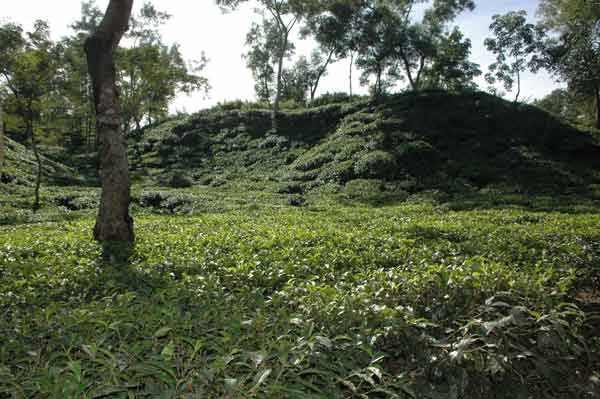
Early morning on Tuesday 6 December I (Lars) went to Sylhet in the North Eastern part of Bangladesh, by GMG Airlines. It is a 50 minutes flight in a small propeller-driven aircraft over the lush Bangladeshi countryside, crisscrossed with streams and rivers, and covered with rice fields and agricultural land divided into small plots. Closer to Sylhet the landscape changes into small hills, this is the land of the Bangladeshi tea gardens (photo to the right).
Sylhet was the only part of British India that at the time of partition in 1947 was given the right to hold a referendum on whether the then Assamese region of Sylhet should become part of India or Pakistan. Sylhet had a majority of Muslim Bengalis and opted for Pakistan, so then the first division of Assam took place, cutting links with the neighbouring Khasi and Jaintia Hills (now in the Indian state of Meghalaya). Till 1965 trains did however still ply between Sylhet district and Guwahati via Silchar, but after the 1965 India-Pakistan war all train lines connecting India and the then East Pakistan were closed, and so are the communications still after 40 years.
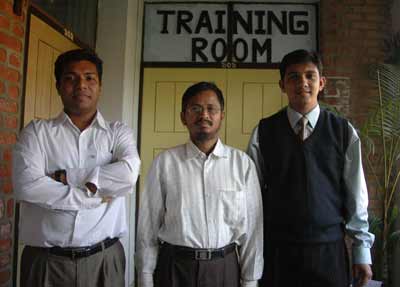 |
| Rezaul Kabir Chowdhury, Dept. of Civil and Environmental Engineering; Md. Aktarul Islam Chowdhury, Head of Dept. of Civil and Environmental Engineering/Architecture; and Shamim (Md. Abdul Mumin), Dept. of of Chemical Engineering and Polymer Science. |
On the way from Sylhet Airport (an airport which has international flights direct to England as there is a sizable population of Sylhetis in Britain, not least in the restaurant business) you pass through tea gardens – the oldest from 1854, that stretch all the way to the city limits. As my flight was earlier than scheduled (I was supposed to arrive only in the afternoon) my contact persons in Sylhet, the two lecturers Md. Abdul Mumin (called Shamim), Lecturer of Chemical Engineering and Polymer Science, and Rezaul Kabir Chowdhury, Lecturer of Civil and Environmental Engineering, had not come to the airport to receive me (the contact was actually established through Professor Sarif Masud, currently working in El Paso, Texas, friend of Rezaul and Shamim).
I took a taxi and asked the driver to take me to a good hotel in town,
reached Hotel Polash in the city centre and got an excellent room for
1400 takas, approximately 20 US-dollars. It seemed as if I was the only
guest staying at the hotel.
A meeting at the university, Shahjalal University of Science and Technology
(SUST), was planned for the following day only, but after informing my
hosts over telephone that I had already arrived, a new programme was immediately
set up.
Shamim and Rezaul picked me up at the hotel and we went with a university
vehicle through Sylhet, with streets crowded with cycle rickshaws, out
of the city centre and reached the SUST campus located in a beautiful
environment, surrounded by hills and with rice fields stretching even
between the department buildings (see photo below).
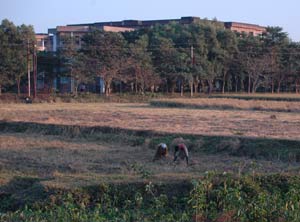 SUST
is a young university that started in 1991 with only three departments:
Physics, Chemistry and Economics, and 200 students. It has since grown
and has today 6 000 students and 240 teachers. The university consists
of seven schools:
SUST
is a young university that started in 1991 with only three departments:
Physics, Chemistry and Economics, and 200 students. It has since grown
and has today 6 000 students and 240 teachers. The university consists
of seven schools:
• School of Agriculture and Mineral Sciences (including a department of Forestry).
• School of Applied Science and Technology
• School of Management and Business Administration
• School of Physical Sciences (Chemistry, Physics, Mathematics and Statistics)
• School of Social Sciences (Anthropology, Economics, English, Political Studies and Public Administration, Sociology, and Social Work).
• School of Medical Sciences (with three affiliated medical colleges).
• School of Life Sciences (Biotechnology and Genetics, and one affiliated Veterinary college).
Several university teachers are currently undergoing Masters and PhD training abroad, and others are planning for it. One of them, the sociologist T.M. Abdullah al Mamun, happens to be very well-known to us, as he recently completed the Masters programme in Asian Studies at Lund University, a programme with links to SASNET.
Meeting at the Dept. of Chemical Engineering and Polymer Science
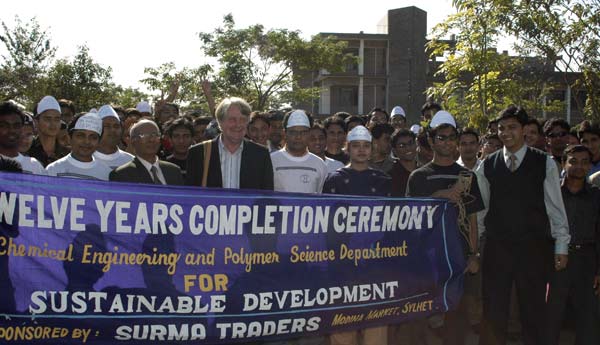 I
was taken to the Dept. of Chemical Engineering and Polymer Science at
the School of Applied Science and Technology, and was received by Professor
Mohammed Zainal Abedin. He studied
at the Free University in Berlin and received his PhD in 1978, and he
had fond memories of a visit to Denmark and Malmö.
I
was taken to the Dept. of Chemical Engineering and Polymer Science at
the School of Applied Science and Technology, and was received by Professor
Mohammed Zainal Abedin. He studied
at the Free University in Berlin and received his PhD in 1978, and he
had fond memories of a visit to Denmark and Malmö.
Dr. Abedin called colleagues at his own and other departments for a meeting in the seminar hall at 12 o’clock, and the interest was large. More than 20 people turned up to listen to a presentation about SASNET, and many questions were raised. Of the 240 teachers in the university no less than 20 have received their PhDs in other countries.
Participants of the meeting:
• Md. Aktarul Islam Chowdhury,
Head of Dept. of Civil and Environmental Engineering/Architecture
• Muhammad Azizul Hoque,
Dept. of Civil and Environmental Engineering
• Rezaul Kabir Chowdhury,
Dept. of Civil and Environmental Engineering
• Dr. Md. Jahir B. Alam, Dept.
of Civil and Environmental Engineering
• Rauibul Alam, Dept. of
Civil and Environmental Engineering
• Dr. Mushtaq Ahmed,
Dept. of Civil and Environmental Engineering
• Saidur Rahman Chowdhury,
Dept. of Civil and Environmental Engineering
• M. Faruqui Uddin, Dept.
of Sociology
• A. H. M. Belayeth
Hussain, Dept. of Sociology
• Prof. M. Z. Abedin, Dean
of Dept. of Chemical Engineering and Polymer Science
• M. Mashbum Rahman, Dept.
of Chemical Engineering and Polymer Science
• Dr. M. R. Khan, Dept. of
Chemical Engineering and Polymer Science
• Salma Akhter, Dept. of
Chemical Engineering and Polymer Science
• Md. Jasim Uddin, Dept.
of Tea Technology
• P. M. Rabiul Islam, Dept.
of Tea Technology
• A. Z. M. Manzoor Rashid,
Assistant Professor, Dept. of Forestry
• Dr. Tulsi Kumar Das,
Dept. of Social Work
• Redwanur Rahman, Dept.
of Political Studies & Public Administration
• Dr. M. Mizanul Haque Kazal,
Head of Dept. of Economics
Meeting with the Vice-Chancellor
After the meeting Dr. Abedin brought me to the Vice Chancellor’s office. On the way we met a jolly group of students, celebrating the end of the semester and the 12th anniversary of the Chemical Engineering department. Festivities were planned for the evening, and the students now asked for my presence.
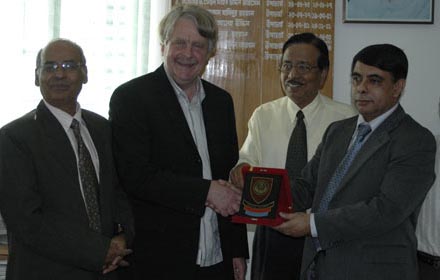 |
| Handing over an official gift from the Shahjalal University of Science and Technology to SASNET. From left to right: Professor Mohammed Zainal Abedin, Dept. of Chemical Engineering and Polymer Science; Lars Eklund; University Registrar Dr. Jamil Ahmed Chowdhury; and the Vice-Chancellor Prof. Musleh Uddin Ahmed. |
The Vice Chancellor, Professor Musleh Uddin
Ahmed, had just returned from a tour to universities in Germany, and
was happy to meet a representative of Swedish universities. The registrar,
Dr. Jamil Ahmed
Chowdhury, a man working also with Statistics and Forestry,
was also present at the meeting.
Dr. Ahmed has previously worked for UNDP, and is eager to involve his
university in international collaboration projects also with Sweden. SUST
is already a partner university in two different European Commission funded
Erasmus Mundus research programmes.
One programme is on Water and Waste Management
with the Dept. of Life Sciences, Karlsruhe University; a technical university
in Calabria, Italy; and a university in Chingsu, China.
The other programme is about IT, and SUST’s
partner institutions in this case are Fachhochschule, Berlin, Germany;
Tampere Polytechnichs in Finland; and Bangladesh University for Technology
and Engineering (BUTE) in Dhaka.
Other research areas, in which SUST is especially strong is environmental
studies, business studies and governance. Negotiations are underway to
initiate collaboration on the latter issue with Heidelberg University.
Meeting at the Dept. of Civil and Environmental Engineering
I was then invited to visit the Dept. of Civil and Environmental Engineering
and had a meeting with Md. Aktarul
Islam Chowdhury, Head of the department. He also expressed a great
interest in collaboration projects with Sweden within the fields that
his department is strong, namely water and waste treatment, and sustainable
development.
Chowdhury has been very productive and showed articles in scientific journals
that he has published. His personal fields of interest are industrial
wastewater management, industrial pollution, especially air pollution,
and environmental management assessment. He is planning for a PhD project
on arsenic contamination.
My local host Rezaul Kabir Chowdhury was
a student at the department who graduated with high marks in 2002. He
is now lecturing at the department, and just like many other young ambitious
teachers at SUST he also hopes for PhD training outside Bangladesh (and
thereafter return to Sylhet). Rezaul’s interest is mainly water
modelling and water resources management.
Meeting at the Dept. of Social Work, School of Social Sciences
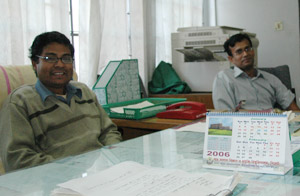 |
| Associate Professor Tulshi Kumar Das and Shofiqur Rahman Chowdhury, Dept. of Social Work. |
A separate meeting was set up at the Dept. of Social Work at the School of Social Sciences, on request from Dr. Tulshi Kumar Das, Associate Professor and Head of the department. One student from the department, Ms. Amina Pervin, has been admitted to a Masters programme at the Dept. of Social Work, Göteborg University, and another one, Shofiqur Rahman Chowdhury, is on a waiting-list for the same programme.
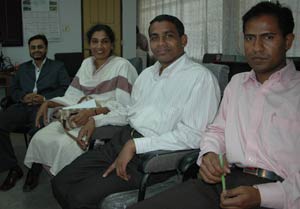 |
| Md. Abdul Muin Noman, Amina Pervin, Neaz Ahmed and A.K.M. Mahbuburzzaman, Dept. of Social Work. |
Social Work at SUST is mostly connected to studies of community development, and is not a discipline directly linked to getting a job as social worker, which is often the case in Sweden.
Other participants at the meeting:
• Muhammed Muazzam Hussain
• Md. Abdul Muin Noman
• Neaz Ahmed
• Dr. A.K.M. Mahbuburzzaman
Celebration in the auditorium
Finally it was time for the evening festivities in the University auditorium,
organised by the students at the Dept. of Chemical Engineering, celebrating
the 12th anniversary of their department, and also an occasion where the
students of the final year welcomed the new students for the semester
that starts in January.
As it turned out I was requested to sit on the stage as a guest of honour
along with the Vice Chancellor Dr. Ahmed, and the Head of the department,
Prof. Abedin, and then the chairman of the student union (who had learnt
about my special family relation to Bengali culture) asked me to introduce
the evening by holding a speech and sing a song by Rabindranath Tagore.
I entered the rostrum, and after holding a short speech I sang in Bengali
the beautiful song ”Tomar holo shuru, amar holo shara”,
an old man’s song to a young man, and the audience, consisting of
circa 300 students and teachers, responded with enthusiastic cheering.
A fitting end to my day-long visit to Shahjalal University of Science
and Technology in Sylhet.
The following day my hosts, Shamim and Rezaul, took me around for a sightseeing tour by auto-riksha in the charming city of Sylhet, visiting a bazar and then one of the many tea gardens that surround Sylhet, before boarding the GMG plane back to Dhaka in the afternoon.
SASNET - Swedish South Asian Studies Network/Lund
University
Address: Scheelevägen 15 D, SE-223 70 Lund, Sweden
Phone: +46 46 222 73 40
Webmaster: Lars Eklund
Last updated
2011-05-24
